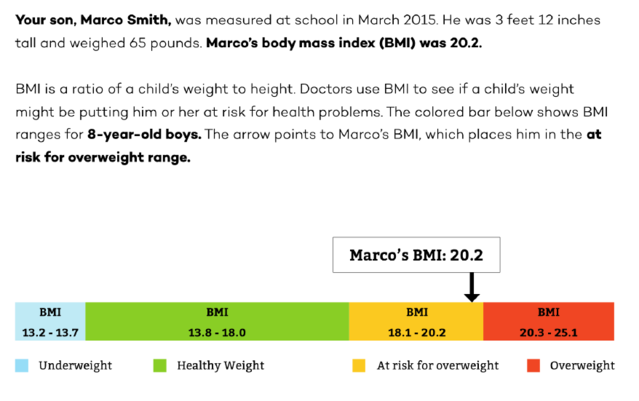Health
Schools Should Stop Giving Kids BMI Report Cards
New study finds body size reports sent to parents do not lead to weight loss.
Posted December 12, 2020 Reviewed by Lybi Ma

Nearly forty percent of children live in districts where schools send “BMI report cards” home to parents, warning parents if their children are overweight or approaching overweight. Originally conceived as a method to combat childhood obesity*, this strategy has generated over a decade of controversy. Some argue that identifying children at-risk for obesity is a key step toward health promotion; others believe conversations about weight are best left to health professionals and have no place in schools. A newly published randomized clinical trial including over 28,000 students concluded that these body size report cards have no appreciable effect on children’s weight. On top of that, evidence from the trial suggests these reports may negatively affect how children feel about their bodies.
In the U.S., 25 states mandate that schools assess their students’ body mass index (BMI). Some of these states also require that parents be notified of their children’s BMI status. Though it may seem obvious that telling parents their children are overweight would lead those children to lose weight (presumably through parental intervention like encouraging healthier eating and exercise habits), this assumption is dubious. First, the thinking behind BMI report cards rests on the questionable assumption that parents of heavier children are not aware their children are overweight.
Further, case studies, interviews, and first-person accounts have suggested that this type of BMI screening increases body shame and weight-related teasing – both of which may lead to more weight gain and even eating disordered behaviors. Though many assume that body-shaming promotes weight loss, it actually tends to do the opposite. What’s more, these body size report cards likely send the message that children should diet. But children who diet are more likely to gain weight long-term, likely because dieting is associated with a decrease in physical activity and can trigger unhealthy eating behaviors like bingeing.
In this new study, published in The Journal of the American Medical Association – Pediatrics, researchers systematically tested the effects of body size report cards. The study included over 28,000 children in grades 3-8 who were attending school in California. The researchers used a randomized clinical trial to test the effect of these parental notifications. Randomized clinical trials are extremely rigorous, the gold standard for this sort of study. Researchers took advantage of the fact that California schools require the regular assessment of height and weight for students. (The choice to turn those assessments into body size reports for parents is made by individual schools.)
Seventy-nine different schools (across five districts) were randomly assigned to one of three groups. In the first group, students received BMI screening and parental reports. The parental reports were developed through a series of focus groups with parents and designed to be easily understood, avoiding academic or medical jargon. Reports classified children as overweight, at risk of overweight, healthy weight, or underweight. They also included recommendations for healthy eating and exercise habits.

In the second group, students were screened for BMI at school, but no report was sent to parents. Finally, in the control group, students did not have their BMI measured at school and there was no communication to parents about their body size. (The state of California waived the normal screening requirement for this group to allow for the study.)
Students received a baseline assessment, a one-year follow-up, and a two-year follow-up. Several months after their BMI assessments, students completed surveys about how often they or their peers were teased about weight, how happy they were with their weight and body shape, and any weight control behaviors they engaged in.
The study’s primary analyses focused on the 40 percent of students in the sample who were classified as overweight or at risk for becoming overweight (defined as having BMIs greater than or equal to the 85th percentile). The study authors found that changes in BMI over the study did not vary by group. In other words, neither assessing students’ body size nor sending parents a body size report had any effect on the children’s weight status over time. This finding is especially notable given that the study design was sensitive enough to detect even very small changes in BMI.

In analyses that included all students (regardless of body size), the researchers also found some evidence that students who were weighed at school showed less satisfaction with their weight. Though findings were less consistent when it came to the impact of in-school BMI assessments on weight-based stigmatization, this finding is still worrisome given that body dissatisfaction and weight-related stigma tend to decrease healthy habits. Weight-based stigma is also linked to negative mental health outcomes among children and adults.
The authors of this important new study make a clear recommendation: When it comes to promoting the health of students, schools should use interventions that are based on solid scientific evidence. Interventions that rely on sending reports to parents about their children’s body size do not meet that standard. School-based body size assessments and parental reports appear to do no good and have the potential to cause harm. Interventions that address socio-economic and environmental contributors to obesity may be more effective and avoid increasing what are already high levels of stigma around weight.

*I use the terms obesity and obese to be consistent with the medical literature reviewed here. The body size reports sent to parents specifically avoided using the term obese, as some parents in the focus groups reported finding it stigmatizing.




